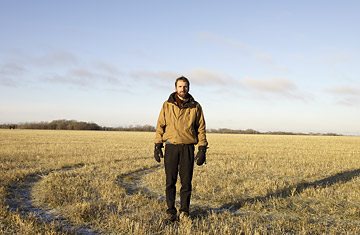
In Minnesota, Daniel Wolpert pastors a conventional, aging congregation but also runs a contemplation center on a plot of former farmland.
(2 of 2)
But creativity isn't the problem in places like this gorgeous, wind-strafed corner of Minnesota, where clergy are trying out several innovative ways to keep God in the heartland. The fertile, Scandinavian-settled farm towns in the Red River Valley were the models for Garrison Keillor's Lake Wobegon; for decades, thousands of farmers comfortably worked 80-acre lots and prayed in small, ethnically uniform churches. But starting in the 1970s, Wobegon was hit with sinking commodity prices and job-cutting farm technology, a combo that sharply reduced the population. Churches foundered. But only in the past few years have people like Haythorn and Wolpert begun experimenting with new ways to counter the trend.
One response to the pastor shortage is "yoking" two congregations to share a circuit-riding minister--and one salary. Along the Minnesota--North Dakota line, the yokes stretch thin. Jeff Gustafson, in the town of Warren, Minn., adds a degree of difficulty: he's Methodist, but one of his two yoked churches is Presbyterian. Another pastor travels 200 miles (about 320 km) every weekend to serve five churches. A botched three-pastor attempt to connect three already yoked churches (including Grue) with four more resulted in, among other things, shut-ins being overlooked and not receiving Communion for years.
Yet the believers don't give up. Many denominations are exploring ways to allow laypeople to preach. Some ordain laymen and -women but restrict them to their home pulpit. Wolpert of Crookston's First Presbyterian entertains even more radical visions. The average age of his Sunday flock is 63 (Carol Porter is now a member). But he is also founder of the Minnesota Institute of Contemplation and Healing, an energy-independent, nationally ambitious retreat center offering ancient disciplines such as icon and walking meditations and surrounded by a storybook hayfield with a view of the Red Lake River. Wolpert sees God's future here as extending beyond small-town churchgoers to northern Minnesota's more ethnically varied newcomers and even to religious tourists. "This is an incredibly powerful landscape," he says. "If something here is passing, then God will raise up other forms of worship, because people will be drawn here."
His friend and more down-to-earth counterpoint is Nathan Baker-Trinity, a 31-year-old Lutheran pastor and FTE fellow who shuttles a red Mercury Tracer between two yoked churches near the White Earth Indian Reservation. His answer to the pastor shortage is simply to commit to the countryside (he grew up in rural Iowa). "I was like, 'Why wouldn't you go to a rural area?'" he says. Baker-Trinity is an indefatigable local booster. "They're talking about making my whole town wireless!" he says enthusiastically. Equally smitten are his parishioners, like Howard Steinmetz. After decades working his farm--most of them minus a hand lost to a field chopper in 1959--Steinmetz is finally auctioning off the land. Selling, he says, "is tough." But his religious life is supporting him. "Everybody was pretty excited to get a young one," he says, indicating Baker-Trinity.
On All Saints' Day in November, when Lutherans recognize the holy who have passed on and their connection to the living, Baker-Trinity notes that the holiday reinforces the web of community that "has always been the rural church's strength." Before the sermon, he gathers the children. There are at least 10--an extraordinary tally for a congregation in this area. The young pastor, with two babies himself, talks softly about a God who never departs. "God is with you wherever you are going," he tells the youngsters. "God never says goodbye to us. Let's pray: O God, thank you for not saying goodbye. Thank you for always being with us."
Travel with the Pastors Meet ministers making the rounds in prairie towns at time.com/pastors
